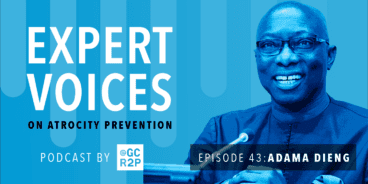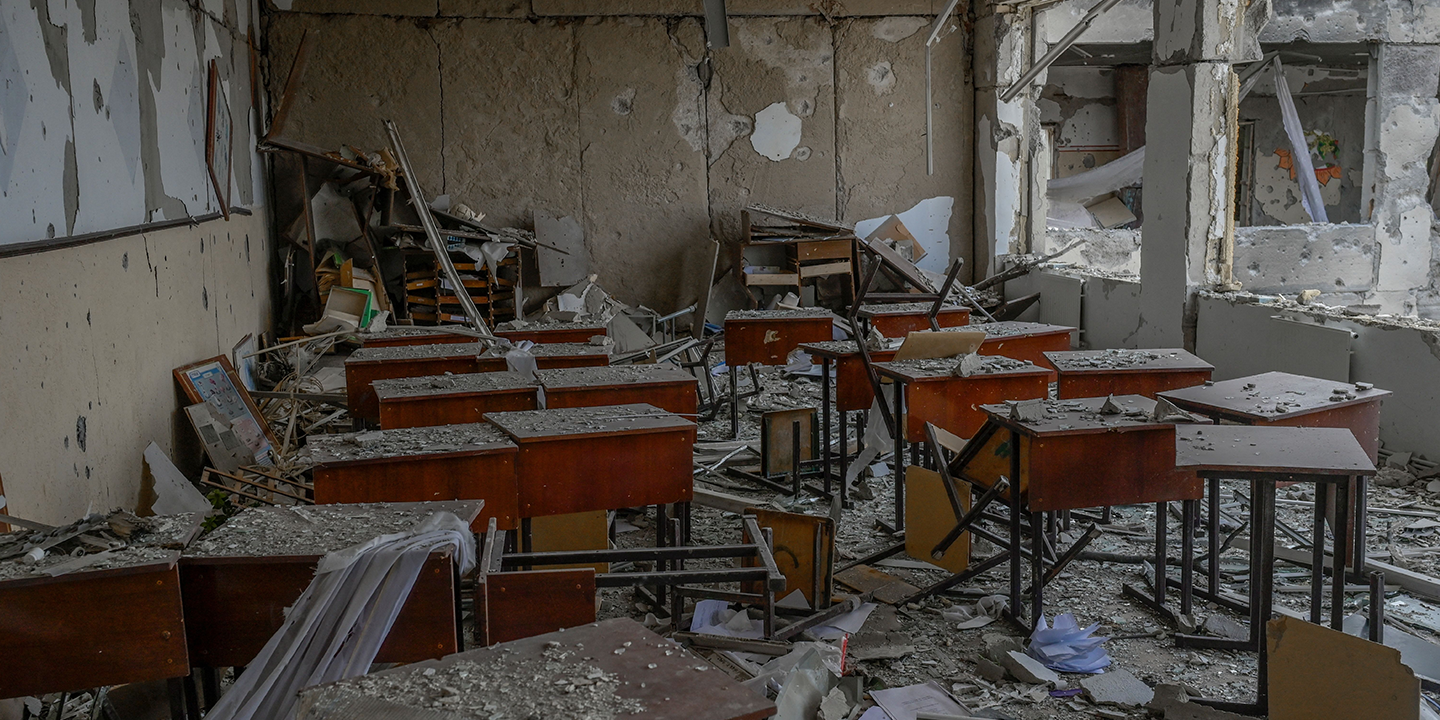

Atrocity Alert No. 300: Ukraine, Central African Republic and South Sudan
Atrocity Alert is a weekly publication by the Global Centre for the Responsibility to Protect highlighting situations where populations are at risk of, or are enduring, mass atrocity crimes.
DEADLY STRIKES ON CIVILIAN SHELTERS AND INFRASTRUCTURE CONTINUE IN UKRAINE
On 7 May Russia allegedly perpetrated an airstrike on a school in Bilohorivka, Luhansk region, in eastern Ukraine. An estimated 60 people were believed to have been killed in the attack. The governor of the Luhansk region said that around 90 people – the majority of the village – had been sheltering in the school when a plane dropped a bomb, causing the building to collapse and catch fire.
Following visits to the Kyiv and Chernihiv regions during May, the UN Human Rights Monitoring Mission in Ukraine (HRMMU) reported on the devastating consequences of the conflict for civilians, including the wanton destruction of schools, hospitals, homes and places of worship. The HRMMU recorded that hundreds of educational and medical facilities have been destroyed or damaged. In many areas of Ukraine, both the Ukrainian and Russian armed forces have reportedly used schools as bases and have placed heavy military equipment near them.
On 7 May all remaining women, children and elderly civilians were evacuated from the Azovstal steel plant, the last Ukrainian military holdout in the city of Mariupol. The city has been besieged for weeks, with direct strikes on homes, schools, healthcare centers and other buildings known to be sheltering civilians. In what may be the single most deadly incident so far, new analysis by the Associated Press estimates that at least 600 people were killed when Russian forces bombed Mariupol’s Drama Theater on 16 March.
Since the invasion, the HRMMU has documented over 3,490 civilian deaths while reiterating that the real toll is thousands higher. The Head of the HRMMU, Matilda Bogner, stated that, “the high number of civilian casualties and the extent of destruction and damage to civilian objects strongly suggest violations of the principles governing the conduct of hostilities, namely distinction, including the prohibition of indiscriminate attacks, proportionality and precautions.”
Tomorrow, 12 May, the UN Human Rights Council will hold a special session on the situation in Ukraine. At the special session, the Global Centre encourages member states to adopt a resolution that supports and strengthens the work of the previously-established International Independent Commission of Inquiry on Ukraine. The resolution should also emphasize accountability for war crimes and crimes against humanity perpetrated in Ukraine.
MOUNTING EVIDENCE OF ATROCITIES BY RUSSIAN-LINKED FORCES IN CENTRAL AFRICAN REPUBLIC
Between 11-12 April at least 10 civilians were killed in the villages of Gordil and Ndah, Central African Republic (CAR), during operations reportedly carried out by the Central African Armed Forces (FACA) and Russian-linked forces. Eyewitness accounts reported that about 30 motorcycles were stolen and several houses allegedly burned down during the attack. On 15 April the UN announced it would investigate the incident.
Similar attacks have been carried out by Russian-linked forces, alongside FACA troops, for several years. According to a report by Human Rights Watch released on 3 May, Russian-linked forces have summarily executed, tortured, arbitrarily detained and beaten civilians in CAR since 2019. Amongst these forces are a significant number of mercenaries from the Russian private military security company, the Wagner Group, which has a history of perpetrating atrocities in other conflict zones, including Syria and Libya.
For nearly two years, the UN has documented systemic and grave human rights and International Humanitarian Law violations allegedly perpetrated by Russian-linked forces during operations and field deployments with near-complete impunity. The documented violations include indiscriminate killings, torture, sexual violence, forced disappearances and widespread looting. The UN Independent Expert on the situation of human rights in CAR has accused these forces of “systematically hindering the work of [UN] investigators” in areas where alleged crimes have occurred.
The lack of accountability for previous crimes has emboldened perpetrators to commit further abuses. According to news sources, Russian-linked forces allegedly stormed a maternity clinic in mid-April, raping two women who had just given birth and a nurse at a maternity clinic located at the Henri Izamo military camp. This was not the first incident of rape by these forces. In October UN experts said they received reports that Wagner Group officers committed rape and sexual violence across the country; however, the number of victims remains unclear “because survivors are terrified to bring their cases to justice for fear of retaliation.”
All perpetrators of atrocities in CAR should be held legally accountable, regardless of their rank, affiliation or nationality. The CAR government, the Special Criminal Court in CAR, or the International Criminal Court, should investigate all credible allegations of abuse by Russia-linked forces. While attempting to combat armed groups, it is imperative that all forces supporting the CAR government uphold their responsibility to protect. CAR authorities should end all relationships with private military and security personnel, particularly the Wagner Group.
“HORRIFIC” SURGE IN VIOLENCE THREATENS PEACE IN SOUTH SUDAN
On 25 April the UN Mission in South Sudan condemned the “horrific” surge of violence in Leer county, Unity State, including rapes, gang rapes, beheadings, burning civilians alive and attacks on humanitarians. At least 72 civilians were killed and 64 cases of sexual violence were recorded between 17 February and 7 April in the area.
The violence in Unity State is a recent example of the deteriorating security situation in South Sudan. On 28 April the UN Security Council (UNSC)-mandated Panel of Experts monitoring the sanctions regime in South Sudan issued a report alleging that political disputes between signatories to the 2018 peace agreement continue to result in deadly subnational violence and persistent ceasefire violations. The report documented evidence of serious human rights violations and abuses, including sexual and gender-based violence, which has become a “tragic hallmark” of the conflict.
Political instability and armed conflict have been pervasive in South Sudan for the majority of its almost 11 years of independence. Delays in implementing the peace agreement and ongoing political rivalries have exacerbated tensions within South Sudan’s ethnically diverse population. According to the Panel of Experts, the “gridlocked” peace agreement has “itself become a lucrative venue for elite power politics” rather than “delivering transformational change to the predatory political system of South Sudan.”
The UN Human Rights Council-mandated Commission on Human Rights in South Sudan (CHRSS) has similarly warned of increased political violence and polarization, leading to fragmentation and increased ethnic divisions, “in which women and girls are acutely at risk of sexual violence.” The CHRSS also cautioned that ongoing arms proliferation has not only fueled cyclic violence and human rights violations and abuses, it has also compromised any prospects of peacebuilding.
The UNSC is scheduled to decide this month whether to extend South Sudan’s sanctions regime, including the arms embargo. Given the warnings from multiple UN entities, the UNSC must exert increased diplomatic pressure on all warring parties by maintaining the current arms embargo and extending targeted sanctions against those who continue to threaten peace and security in South Sudan. Parties to the peace agreement must expeditiously implement outstanding provisions, as well as address the root causes of conflict and better manage ethnic diversity in the country.
Related Content


Atrocity Alert No. 434: Sudan, Ethiopia and the UN Human Rights Council
